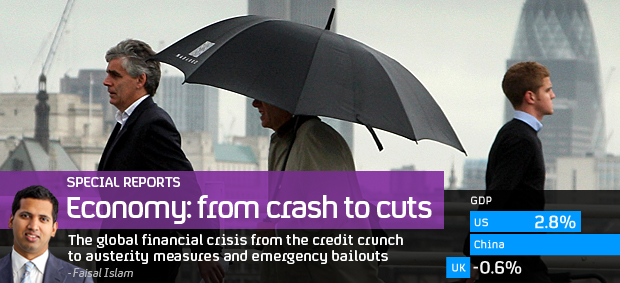Greece’s debt crisis threatens to sink the euro
 Siobhan Kennedy
Washington Correspondent
Siobhan Kennedy
Washington Correspondent
As Greece battles to avoid defaulting on its debts, Channel 4 News Business Correspondent Siobhan Kennedy says the pain could only just be starting for the rest of Europe and the UK.

Eurozone finance ministers have met in Luxembourg to determine the terms on which Greece should receive the latest 12bn euro tranche of the 110bn euro bailout it secured in 2010.
They ended up delaying approval of the aid for two weeks, by which time the Greek government has to have approved a new package of austerity measures.
As each painful day goes by, the prospect of a bankrupt Greece looks more and more inevitable.
But those – like Boris Johnson – calling for Athens to hurry up and get on with it should be careful what they wish for, writes Channel 4 News Business Correspondent Siobhan Kennedy.
For the crisis in Greece isn’t really about Greek sovereign debt (as much as Merkel & Co would like you to believe). It’s about Greek bank debt – and Greek bank debt is linked to us all because – guess what? – our banks, along with French and German institutions, are the ones that did the majority of the lending. So if Greece defaults, the pain wouldn’t stop there. It fact, it would simply be the starting point.
In exactly the same way as American banks lent risky sub-prime loans to families who weren’t able to pay the money back, so in the heyday Europe’s banks were lending to Greece (and other weaker European economies) at rates that made them look and feel as stable as Germany. There was no risk priced in – no-one ever stopped to think the unthinkable, that an economy in the developed world would default on its loans. So the lenders kept on lending and the borrowers kept on borrowing. Then the music stopped.
Now Greece is sitting on debts of $350bn, or 160 per cent of its national output.
More from Channel 4 News: Eurozone sets bailout deadline for Greece
The first and obvious impact of a Greek default is its own banks collapse – that’s a given. But French banks are heavily exposed too. They are owed about 53bn euros, while Germany’s banks stand to lose 34bn. Britain has the next biggest exposure, with 13bn euros worth of lending.
So at the very least, all the banks in those countries that lent to Greece would need to come up with the money or be recapitalised. At a time when governments – particularly here in Britain – have no cash to spare and citizens are up to their necks in austerity.
Which is the reason why Merkel and Sarkozy are so desperate to keep Greece afloat. It’s not just about the euro. After all, if the value of the euro falls because of the crisis (which it has done already) that only strengthens eurozone exports, which certainly doesn’t do Germany any harm.
Of course there’s the loss of credibility that goes with a depreciating currency. But again, I would argue that horse has already bolted. No, the real thing keeping Merkel up at night has to be the banks.
‘We need to know where the bodies are lying’
But it’s not just the money lent to Greece that’s at stake. It’s the insurance that was taken out against those loans going bust. The dreaded credit default swap – or CDS – market, as it’s known. And here the detail is much more murky because no-one really knows who’s sitting on what CDS contracts or how big they are. But we do know Britain has played a central role in underwriting and parcelling up huge chunks of them. And it’s that fear of the unknown that’s so dangerous.
So before we push Greece into a speedy bankruptcy, governments around the world need to call an amnesty on Greek bonds and credit default swaps. This time round, unlike with the forced collapse of Lehman Brothers, we need to know where the bodies are lying before we pull the plug, not after.
‘A slow death’
Danny Gabay of Fathom Financial Consulting told Channel 4 News: “What is inevitable is that Greece will have to enact some kind of default. It simply can’t do what it’s being asked to do.
Mr Gabay sounded a warning for the UK. “We’re all in this together – and the problems that Greece has are replicated around a number of countries, our own included.”
And he warned: “You can only fight maths for so long. (Greece) owes something approaching 150 per cent of its income. It simply cannot pay back the 350bn (euros) that it’s borrowed.
Meanwhile, London Mayor Boris Johnson has entered the debate. In an article in the Daily Telegraph, he called on Greece to leave the euro and “forge a new economic identity with a New Drachma”.
And Labour’s former foreign secretary Jack Straw said: “If this euro in its current form is going to collapse, is it better not that it happens quickly rather than a slow death?”
-
Latest news
-
As India goes to the polls in the world’s largest election – what do British-Indians think?6m

-
Tees Valley: Meet the candidates in one of the biggest contests coming up in May’s local elections4m

-
Keir Starmer says public sector reform will be a struggle7m

-
Nicola Sturgeon’s husband Peter Murrell charged with embezzlement of funds from SNP1m

-
Ukraine might finally get $60billion in American weapons and assistance to defend against Russia3m

-





